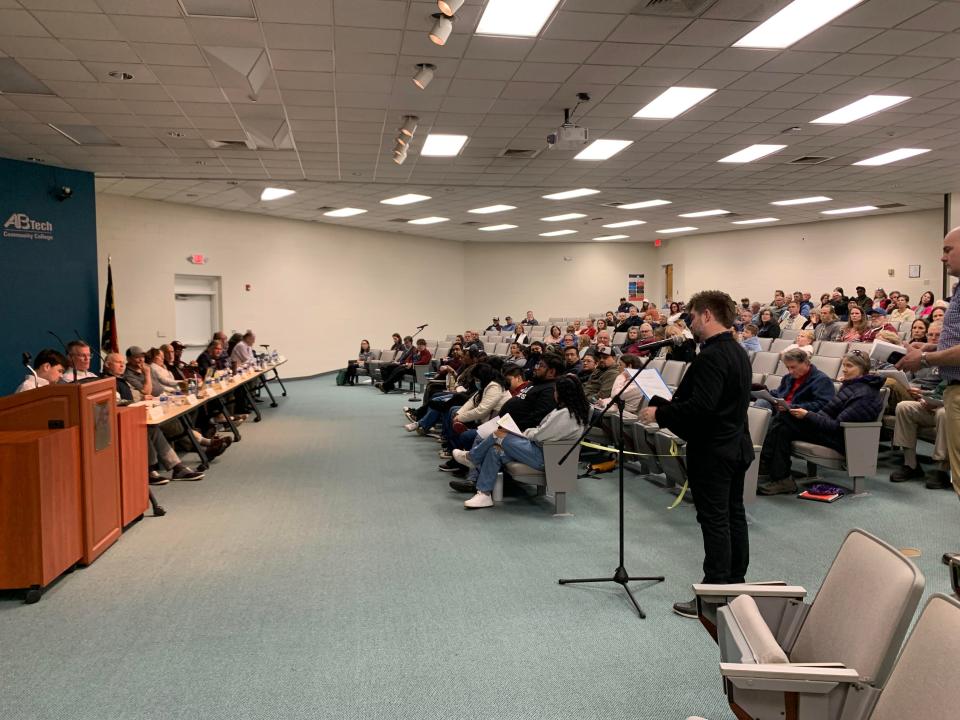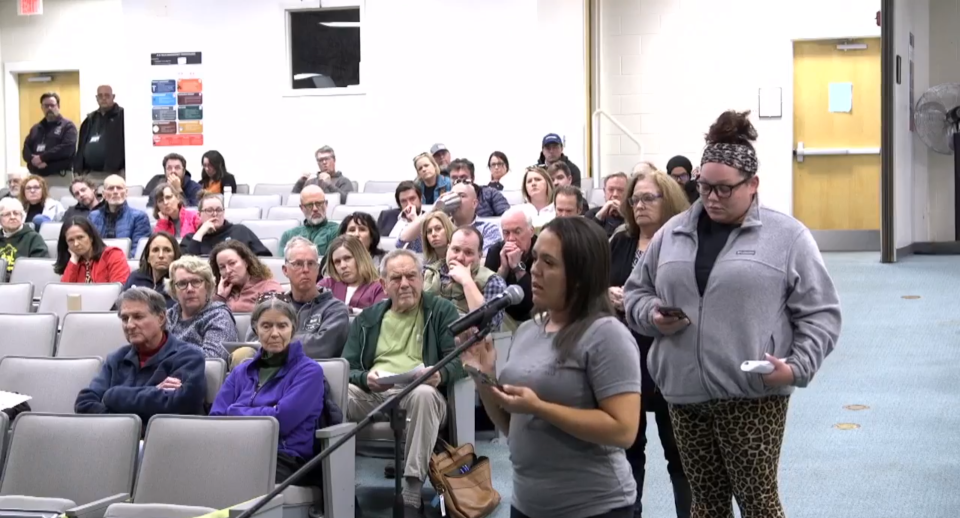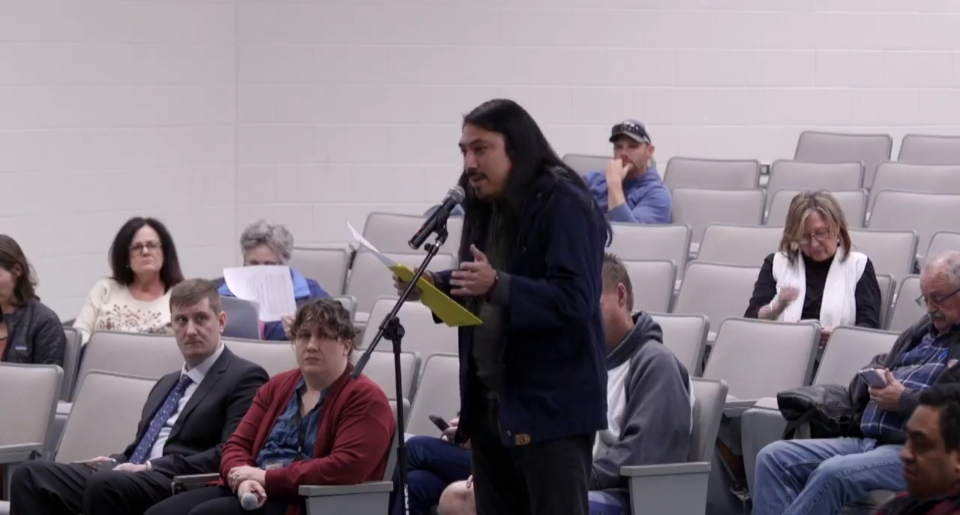Buncombe residents at odds over Airbnb regulations; pro-rental group launches campaign
ASHEVILLE - As people filed through the doors of AB-Tech's Ferguson Auditorium ahead of the March 18 Buncombe County Planning Board meeting, they were handed a bright green flyer that read "Commissioners: Don't kill our economy!"

The flyer, targeted at Buncombe County Commissioners, was made by No Ban for Buncombe, a new campaign against the proposed regulations of short-term vacation rentals, commonly called Airbnbs.
Opponents of a ban on STRs in certain zoning districts say the regulations would hurt those who make their living from the tourism-based rental economy.
During her short speech before the Planning Board, Stephanie Allison, owner of Old Fort-based Allison Home Services LLC, asked a question to the audience.

"Whose business or vendor would be adversely affected by these regulations?" she said.
Hands shot up across the room.
Allison's company cleans short-term rentals and has 60 clients and 10 employees, she said, noting the regulations would be "absolutely devastating."
"You know, we may just be cleaners to you guys, but it's much more than that," Allison said. "It takes a village to do what we do."
The effort to slow regulatory measures has been spearheaded by the STR Trust, a Buncombe County-based "short-term rental alliance" made up of local property managers and STR owners who have partnered with the NC REALTORS Association and the Land of Sky Association of Realtors. The STR Trust has paid for the new No Ban for Buncombe campaign.
Owner and founder of Greybeard Realty and Rentals Chip Craig is chair of the STR Trust.
Craig points to negative economic impacts on hospitality and dining as possible outcomes from the regulations.
"49% of the available rooms in Buncombe County are short-term rental rooms," Craig said.
"You start reducing that number, what's it going to do to our local restaurants?"
Others called for the effort to be slowed down.
"Let's just give it a minute before we push all these things through," said Carolyn Black, owner of Fletcher-based vacation rental management company Inspired Getaway.
More: Answer Man: Are appliances and furniture included in Buncombe County rental appraisals?
More: Asheville-area landowners propose personal landing strip, residents worried for safety

Regulation advocates emphasize community
The effort to regulate STRs comes as Buncombe's Fair Market Rent and housing costs continue setting records in the area, pushing the living wage to over $22 an hour, and cutting into the supply of affordable housing.
Residents from the Emma community, a West Asheville neighborhood with a large Hispanic population, spoke in support of the proposed regulations. In the January public listening session, the neighborhood explained how regulating STRs could help protect the loss of housing in the area.
Speaking on behalf of the Emma community, Alan Ramirez noted that a neighborhood map had displayed the homes, which had been replaced with STRs.
"It is indisputable that for communities like ours, short-term rentals remove rental and homeownership opportunities," Ramirez said. "That's what we saw on the map when we looked at it together. The community is in crisis."
Chris Joyell, the Director of Healthy Communities at Mountain True, spoke in support of the regulations, noting that regulating the 5,000 projected units of housing stock taken up by STRs would likely bring some back online, noting the effort is "not the silver bullet," but "certainly helps."
"This is one of I think many solutions we need in order to make housing more attainable here in Buncombe County," Joyell said.
Others who live next to Airbnbs noted that they much rather have community members than short-term renters living next to them.
"What I'm saying is: We don't want to drive our community members out of the county. We don't want to have a county of tourists," said Judy Mattox.
Maddox, who said she lives next to an Airbnb, would prefer someone she knew.
"I would love to have a community member living next to me," she said.
Is it legal?
Craig said his business most likely won't be impacted by the Buncombe County regulations, noting he would grow his company in the counties he serves outside of the county. Yet, he suggested another possible outcome of regulations: a legal battle.
Possible regulations could lead to "$10,000's" in legal fees for the county, Craig noted, though said he wouldn't be filing legal action against the county.
If Buncombe County faced a legal battle after passing STR regulations, it wouldn't be the first.
Iredell County passed regulations on STRs in late 2023, though the county was swiftly met with a lawsuit before the regulations took effect. A motion for injunctive relief has barred the county from pursuing further enforcement as the lawsuit continues, according to the Iredell County website.
"Can you imagine the legal landscape if they ban them?" Craig said.
Want to learn more?
A summary of the proposed amendments to short-term rentals includes limiting the use of dwelling units for certain zoning districts, reducing the maximum gross floor area for an STR and the development of a zoning permit process, which would allow pre-existing STRs to remain in operation. Here are some of the proposed amendments:
Limit the use of short-term rentals and grouped complexes of STRs to commercial zoning districts, where grouped complexes would have to seek a Special Use Permit.
Change the definition of STR to allow only single-family detached units to be rented short-term and clarify that the definition includes those that are rented for a minimum of two days and no more than 30 days.
Require the rental of units for two nights every 180 days to maintain legal status of pre-existing STRs.
Prohibit short-term rentals in Manufactured Home Parks.
Create Special Requirement standards for short-term rentals in commercial areas, including parking, spacing and event limits.
A full list of the proposed short-term rental regulations and meeting video can be viewed at engage.buncombecounty.org/buncombeplanningboard.
More: Asheville rescinds $1.2 million affordable housing loan as developer makes Airbnb pivot
More: Asheville-area Airbnb owners sued for allegedly dumping renter 'raw sewage' in woods
Will Hofmann is the Growth and Development Reporter for the Asheville Citizen Times, part of the USA Today Network. Got a tip? Email him at WHofmann@citizentimes.com.
This article originally appeared on Asheville Citizen Times: Buncombe Airbnb regulation hearing sees residents at odds

